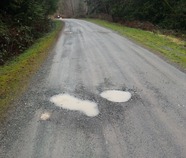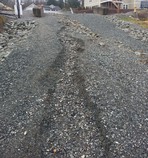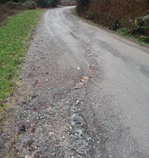
Of Potholes and Profit Holes
The following is from a four part article I published on my LinkedIn and Facebook pages in January, 2016. It explains why getting outside help is a good idea if your goal is to maximize profit and minimize heartburn.
Q: What do potholes and lackluster balance sheets have in common?
A: They both are preventable.
Let’s say your driveway is of the gravel variety and looks like a minefield, riddled with potholes. You are fed up with dodging around and plowing through them. So you do what 99% of folks with gravel driveways do: You hire a contractor to bring in and spread some new gravel. You shell out thousands of dollars.
“Yay!” you say driving over your nicely restored smooth surface, “I fixed it!” But then it rains a few times and you notice small puddles forming in the tire ruts. Over weeks and months the puddles become new potholes. After so long a time you can no longer stand the dodging and plowing and again call the contractor. He tells you potholes are inevitable, that the only way to truly fix them is to pave over with asphalt, which costs twenty times the amount of more gravel. You opt for more gravel. This pattern repeats and repeats. You spend thousands yearly and chalk it up to the unfortunate reality of owning a gravel driveway.
One gravel driveway owner in a hundred does things a little differently. The first time potholes rear their ugly bellies, she calls not a contractor but a civil engineer. She pays him five hundred dollars to come out and assess the situation. He explains the science of potholes and what must be done to not only fill them but also to prevent them from coming back. He draws up a sketch showing slopes and drainage. He recommends a couple good contractors. He invites phone calls during construction. She does exactly as the engineer recommends, shelling out thousands of dollars.
Afterward she says, “Yay, I love my nice smooth driveway!” Five years later, she is still saying the same thing. Over the course of that time she has spent half as much as the 99% who don’t get expert help, and she has endured much less aggravation.
What prompted me to tell this story is that where I live I see this scenario play out constantly. My neighbors spend tens of thousands applying gravel on gravel in the hope that someday the potholes will finally be cured. Unfortunately no one calls a civil engineer and so the potholes always come back. It’s painful, I tell you.
I understand the 99 percent’s thinking: “How complicated can a gravel road be? It’s just gravel for crying out loud. Glorified dirt. No way am I going to spend $500 for some snooty engineer to tell me what I already know.”
Turns out gravel roads are darned complicated. Potholes are caused by water. If you don’t get the water off the road, potholes will happen. Proper gravel road design involves slope (both longitudinal and sideways,) type of gravel, thickness of gravel, drainage, and maintenance. Most homeowners and contractors don’t understand those things, but a good civil engineer does.
Now here is the PIE connection. Just like gravel road owners, 99 percent of business owners and managers don’t know what they don’t know. Year in and year out they unwittingly make mistakes costing them many thousands of dollars.
Running a business seems pretty simple, kind of like owning a gravel driveway. When potholes come around, you just fill them with gravel, right? When profit holes come along, you just fill them with money. It’s what everyone does. It’s just part of the gig. Right?
Well, no, it doesn’t have to be that way. How much money are you willing to dump into your profit holes before you hire an expert to teach you how to actually fix the underlying problems?
When I was a young entrepreneur starting out in business, I would have never spent a nickel on a business consultant. Over the years, that arrogance has cost me hundreds of thousands of dollars. Profit dollars. Keep in mind, profit is the thin layer of sweet cream at the top of your revenue bucket that is used to grow the business and pay for bonuses. No profit and you’re just churning money, enduring the stresses and pitfalls of business without relishing its richest rewards.
Now that I’m 55 and a business consultant, I’ve changed my tune. Do I expect young, brash entrepreneurs like I used to be to hire me? Nope. Too proud, too cheap, and too uninformed, just like I was. I’m finding that my clients are in their 40s and 50s: old enough to have beat their heads against the wall for a long while; smart enough to know they’re losing out; and mature enough to have rid themselves of excess pride. What’s that old saying?... “When the student is ready, the teacher will come.”
W. Edwards Deming, the business consultant largely credited with helping Japan claw its way back from the ashes of WWII to become an international economic power, started his career as an electrical engineer. He discovered a passion for applying math and physics to the manufacturing industry, particularly to quality control. Using those principles and keen human insight, Deming revolutionized the Japanese (and later American) auto industries. Two of his famous Fourteen Points follow, in part:
“13. Institute a vigorous program of education and retraining.
“14. Create a structure in top management that will push every day on the above 13 points. Top management will require guidance from an experienced consultant.”
I find it interesting that Deming published his Fourteen Points when he was 82 years old. By that age he had traveled the world and worked with some of the biggest firms in existence. He had seen time and again companies try to fix their problems and fail. You can find the Fourteen Points in his book, QUALITY, PRODUCTIVITY, AND COMPETETIVE POSITION, 1982, Massachusetts Institute of Technology. If you read Deming’s preface you will also find this sagacious nugget:
“The fact is that management can not learn by experience on the job what they must do to improve quality and productivity and the competitive position of the company. Nor can they learn it in school. In fact, anyone could pass with high marks all the regular courses offered in colleges and universities in business, statistics, and engineering, yet come off with not the faintest idea about how to improve quality, productivity, and competitive position.”
Deming calls it “quality, productivity, and competitive position.” I call it simply, profit, or PIE.
Here’s my take on what Deming is telling us: Running a business well, one that yields high and consistent profits is NOT intuitive. The things you need to know are not taught in school or learned on the job. They must be taught by an outside expert.
My experience both as a business owner and as a business consultant absolutely confirms that. Similar to Deming I began professional life as an engineer (civil / structural.) I started and ran construction, engineering, software, and consulting companies. After 20 years of mediocre success, I began to wonder if maybe I was doing something wrong? Why was I working so many hours, enduring such stress, yet bringing home such modest earnings? I launched myself into the quandary of success: What causes it? Who achieves it? How can one maximize it? Fifteen years and hundreds of books and articles later I found the answers; wrote and published a book about it (PEARL.)
I now travel the country working with small to medium-sized companies. Companies that have been in business for decades and which have weathered numerous recessions. Some of the top companies of their ilk in the nation. Yet, just like Deming predicts, they can not figure out how to maximize their PIE – how to slurp up the thick, rich layer of cream floating elusively at the top of their revenue bucket.
Here is the problem in a nutshell: small and medium-sized companies are generally run by one person – the owner. Sure, there are lots of people, managers and workers, involved but at the end of the day the owner makes the calls.
Business owners are typically long on passion and effort but short on business acumen. They’ve spent their lives, nose to the grindstone, building a company. They are truly experts in their specialized field, but far from experts in the business of business. There has been precious little time devoted to studying the foundations of profit - the counterintuitive concepts taught by Deming, Maxwell, Gerber, Covey, Collins, Levinson, Hill, Carnegie, Beckwith, and Gladwell. They have not studied the titans. They have not studied their competitors.
When I get called it’s usually by an owner who is frazzled and sleep deprived; who has tried everything s/he can think of but nothing seems to work; who has sacrificed to the point where something has to give, even if it means selling the company. Fixing a company is a bit like fixing a gravel driveway – you have to address the foundational issues or the potholes will come back no matter how much gravel you add. Most owners simply need help figuring out those foundational issues and then coming up with a plan to correct them. It’s rarely easy or quick but it is doable, and the consequences of doing nothing are far, far worse.
If you’ve ever watched the TV show, Restaurant Impossible, you’ve seen this in action. Restaurant expert Michael Irvine blows through the flagging establishment, vigorously questioning status quo at every turn. Whether you agree with his methods or not, I think it’s safe to say that if instead, nothing were done the restaurant would, at best, tread water. But more likely it would die a slow, lingering death, exacting a tremendous toll on everyone involved.
So if you are over 40 and are tired of banging your head on the brick wall of low profit, I strongly suggest following Deming’s advice and getting help from an outside expert. Yes it will cost some money but in the end you’ll be orders of magnitude better off: more profit, less stress, reduced frustration.
If you are in your 20s or 30s, brash and proud, well, keep banging away. For you, profit holes are a necessary evil, an unavoidable cost of doing business, right? And besides, gravel is cheap, quick, and easy.




